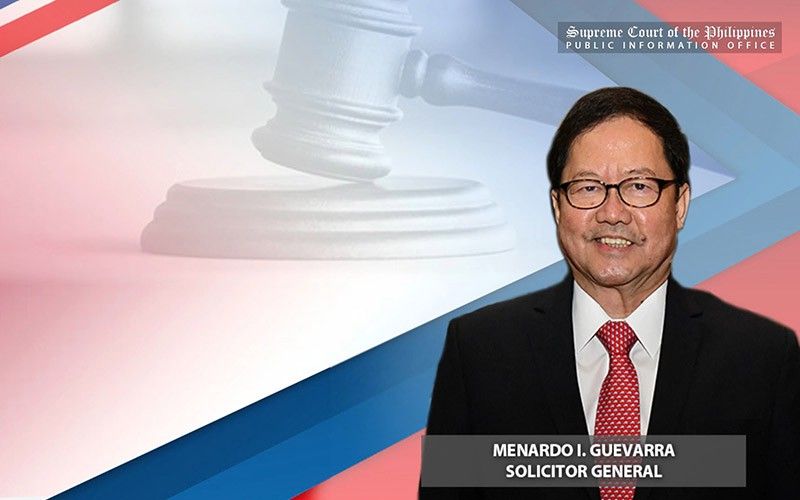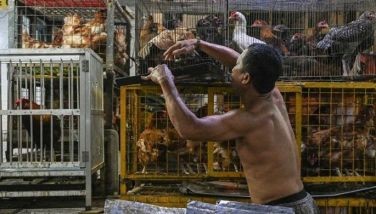Solgen Guevarra defends law postponing barangay, SK polls before Supreme Court

MANILA, Philippines — For Solicitor General Menardo Guevarra, the law postponing the Barangay and Sangguniang Kabataan elections to October 2023 is a matter that involves political question that is beyond the scope pf judicial review.
The Supreme Court on Friday conducted the oral arguments on the petition filed by veteran elections lawyer Romulo Macalintal questioning Republic Act 11935 that postpones the barangay and SK elections (BSKE) to October 2023 from December 2022.
President Ferdinand “Bongbong” Marcos Jr. signed RA 11935 into law on October 10, directing that the BSKE will be conducted on the last Monday of October 2023. Subsequent BSKE will be held every three years.
Guevarra, representing the respondents Commission on Elections and Office of the President, said in his opening statement that judicial scrutiny of Congress’ exercise of legislative power like passing the law to postpone the BSKE is only allowed under very narrow limits.
“Such scrutiny may only happen in two instances, when there is grave abuse of discretion on the part of Congress, when postponement of barangay elections violates any constitutional standards,” he said.
But Guevarra pointed out that Macalintal has not attributed grave abuse of discretion on the part of the Congress in the enactment of RA 11935 nor does postponement violate any constitutional standards.
Macalintal anchored his petition on the argument that “the Constitution does not give Congress the power to ‘postpone’ the barangay elections nor to extend the term of office of the barangay officials.”
Associate Justice Antonio Kho Jr., the first to ask the parties and is a former elections commissioner, also echoed Guevarra’s point during this interpellation.
But Macalintal responded that when he filed his petition, he was guided by some pronouncements of the SC that Petition for Certiorari is a remedy when there are special reasons clearly stated in the petition.
He added that Guevarra’s argument is “too technical.” He continued: “I would submit that when the issue is constitutionality and the law is considered unconstitutional then that clearly shows the abuse of discretion committed by Congress. That is my position.”
Guevarra, under questioning of Justice Kho, however asserted that postponing elections is a political question.
“Unless there is a showing there was grave abuse of discretion, then we believe judicial scrutiny is very much limited. Congress did not include the reason for postponing is precisely because it is a political question,” he said.
But Associate Justice Alfredo Benjamin Caguioa quizzed Guevarra: Is the Congress’ plenary power to determine term of barangay officials limitless? Can it be done it 50, 100 years?
Caguioa pressed: “Law has to be reasonable so the SC can inquire into the reasonableness of the period fixed by Congress.”
Guevarra responded: “As to the reasonableness of the period, if there are indications that the period determined by Congress is tainted with grave abuse of discretion, then yes.”
Term extension?
Macalintal, in his opening statement, however argued before the court that the postponement of the BSKE essentially extends the term of office of the barangay officials without the mandate of the people.
Under RA 11935, all incumbent barangay and sangguniang kabataan officials shall remain in office unless removed or suspended.
“These repeated postponements of barangay election with extension of their terms to boot, then Congress will be a very, very powerful institution in the political arena of our country,” he told the SC.
Macalintal said that this means the holdover officials “can no longer be considered representatives of people in their barangays but they could now be called as representatives of Congress to whom these barangay officials owe their positions.”
But Guevarra, answering the question posed by Associate Justice Japar Dimaampao, said there is no extension of term of barangay officials under RA 11935.
He stressed the law is on postponement of elections. “So the term will end on December 5 but will continue to serve on hold-over capacity only,” the solicitor general added.
Associate Justice Jhosep Lopez, for his part, pressed Macalintal: “Since it was also the creation of law, the legislative body passed the law on such date, don’t you think the Congress has the power also to amend the law earlier passed? Otherwise you will not be giving the power to Congress to amend its own law.”
But Macalintal asserted that such law should only apply prospectively and not retroactively, meaning it will not cover incumbent barangay officials.
'No material time'
Comelec Chair George Garcia, when told to face the justices, said since the signing of the law, the poll body has slowed down their preparations for the BSKE. He also explained that they cannot proceed with procurement of some elections paraphernalia following the signing of RA 11935.
“It’s really not viable and not feasible at this time,” he told the SC.
But Senior Associate Justice Marvic Leonen pointed out the Comelec, before Garcia even entered the poll body, were going to conduct the BSKE. Garcia confirmed that they were already preparing for BSKE then set to be held in December 2020, by the time they are conducting the May 2022 national elections.
“So you had the will you had the capability you had the experience, you had the funds to actually do it by let us say June of this year, September of this year?” Leonen said.
He pointed out the only thing that made it impossible of them to conduct the elections is the law.
“So the reason for not conducting the elections is not logistical?” Leonen asked, to which Garcia answered in the affirmative.
Leonen pressed: “In other words, if we issue a temporary restraining order, you have no choice to continue with your preparations and if you continue with your preparations and find it difficult to conduct it on December 5?”
The justice also reminded the Comelec official that the poll body has Section 5 of the Omnibus Election Code in its arsenal that lists reasons for postponement of election.
“In that case, it is not impossible,” Garcia added.
The oral arguments lasted for four hours. Parties are given 15 days to file their respective memoranda, after which the case is deemed submitted for resolution.
- Latest
- Trending





























